Abstract: Sustainability educators are in a difficult spot. They must describe our unsustainable impacts on the environment and marginalized peoples, our growing understanding of how these impacts affect future generations and other species, and our failures to make the changes necessary to approach sustainability. At the same time they must avoid pushing students over an obscure tipping point where such information causes them to retreat into despair. For despair leads to inaction, which will only hasten the deterioration of planetary health. We propose two approaches to helping students avoid despair and strengthen their motivation for pursuing sustainable changes. One approach appeals to the motivational energy of hope and the other to the power of tranquil resolve described in Stoicism. We understand these approaches to be complementary. The skills of hope work well when we are pursuing long shot goals, while those of tranquil resolve aid when the achievement of our goals is beyond our own control. While the skills of hope are more aligned with our cultural norms and thus likely easier to teach, skills associated with a tranquil resolve can more powerfully (and lastingly) address the climate challenges we face. Pedagogical examples and strategies of these skills in action are offered throughout.
Continue Reading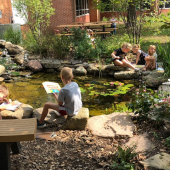
Though often considered an area of importance and emphasis, the enactment of Environmental Sustainability Education can vary considerably across schools and settings. This study used a narrative approach to tell the story of Environmental Sustainability Education at three schools within a 10-mile radius of our institution: a public charter school, a public school with a magnet STEM program, and a private Friends school. Our findings are discussed using the NAAEE’s Essential Underpinnings of Environmental Education, and shed light on possible future direction for pre- and in-service teacher education in Environmental Sustainability Education.
Continue Reading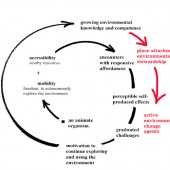
Learning in the outdoors has significant educational advantages for children in the Primary School years and the need to connect with nature is becoming increasingly prominent in research worldwide. Pro-environmental behaviour, especially in the early years, has been shown to have a causal relationship with connectivity with the natural environment. Place-based outdoor learning promotes a relationship with the natural environment and constructs deep environmental knowledge and understanding of the world that surrounds learners. Embedding Indigenous culture and knowledge into outdoor learning within Primary School programs enables local knowledge and understanding to permeate throughout activities in explicit and experiential ways. A place-based pedagogy recognises the importance of forming intimate relationships with place through regular visitations to the same outdoor environment. One of the many global challenges confronting teachers working in Primary schools is how to implement holistic learning into their educational programs. This paper explores how an Australian case study utilises place-based outdoor learning and environmental sustainability within the school curriculum.
Continue ReadingPDF:McClanahanSpring2014 Abstract: In this state of the field response, I suggest that Education for Sustainable Development (ESD) be considered a mindset that is necessary for teacher educators understand and incorporate into their daily business of educating our future teachers, regardless of grade level or content area. Key Words: Education for Sustainable Development, Education for Sustainability, […]
Continue ReadingPDF: Jaimie Cloud JSE May 2014 “The test of a first-rate intelligence is the ability to hold two opposing ideas in mind at the same time and still retain the ability to function. One should, for example, be able to see that things are hopeless yet be determined to make them otherwise.” F. Scott Fitzgerald […]
Continue Reading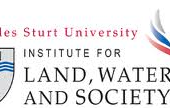
PDF: Rafferty and Laird, Spring 2013 Abstract: This paper explores the observations and perceptions of school children as they engage with nature through place based environmental experiences. The paper reports on two projects, one based in the USA and the other in Australia, designed to promote understanding of sustainability through outdoor […]
Continue Reading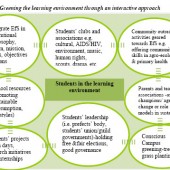
Embedding education for sustainability, in Faith Based Organisations’ (FBOs) school curricula in Uganda, puzzles. Any progressive education system should be dynamic-always calling for timely transformations in content, instructional methodologies, imparted values,
skills and attitudes, to remain holistic. Once these are adequately embraced, the system tends to remain vibrant and relevant to the institutions, the learner and the community. However, in Uganda especially in education institutions of FBOs, Education for
Sustainability (EfS) – a universally conceived aspect of holistic learning seems not to be whole-heartedly attended to either by omission or unawareness. Problems centre mainly on ideological and operational premises. These include lack of awareness, lack of goodwill of
key stakeholders to plan for and manage EfS and lack of competent teachers in EfS aspects. Answers to these problems in essence center on the theoretical underpinning of this report-curricular transformation. Secondly, proper capacity building, integrative planning,
financing and management to enable sustainable programme growth and development should also be enhanced.

In this insightful, foundational and wide-ranging interview, Jaimie Cloud makes the case…and defends it…for the prime importance of Education for Sustainability (EfS). Her ground-breaking work and years of experience bring an authoritative voice to this nascent field and give confidence that, as she says, “it all begins with a change in thinking” and “we just have to educate for it.” Her impressive accomplishments and the examples she brings to the interview are a must-read of inspiration for anyone involved with sustainability education.
Continue Reading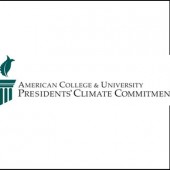
Anthony Cortese and Richard Cook’s clarion call for colleges to join the Presidents’ Climate Commitment lays out the stakes in no uncertain terms. They succinctly define what sustainability education really means in terms of every-day concrete changes for which every institution of higher learning should strive.
Continue Reading